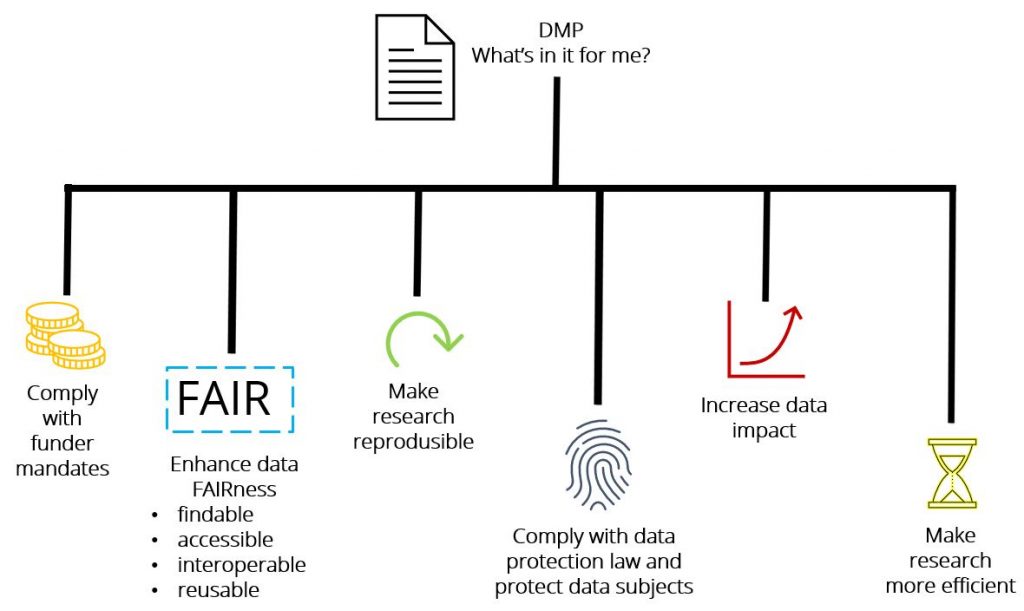Plan to share

Data management and sharing must be planned before starting the research project
A data management plan, DMP (Fig. 12), is an important document to create at the beginning of your research project. DMP describes and documents the collection, processing, storage, archiving and possible sharing or disposal of research data. DMP outlines all aspects of managing your research data, both during and after your project.

Research data management is all about making your work efficient. With appropriate data management planning even sensitive and proprietary data may be shared, reused and FAIR, at least to some extent. All researchers should be familiar with the basics of research data management, regardless of whether they are planning to share the data or not.
Watch the video about what data management planning is, how you do it and why it is important (5:30).
If you haven’t yet participated in any research data management training, find out what kind of training your organisation provides. UEF Library offers the Basics of Research Data Management course (1-2 ECTS) course for UEF postgraduate students. In addition, the study material for the course is openly available to everyone.
Data policies and requirements
Research organisations, funders and journals have data policies that often require or recommend, in addition to creating DMPs, sharing research data for further use when possible. Acquaint yourself with the requirements of your organisation and potential funder before creating your DMP. Then, you can consider their demands in the DMP.
Here are some examples of data policies from different organisations:
- UEF Open Science and Research Policy (see Data policy, pp. 5-8)
- Finnish Environment Institute, Open Data Policy
- The Research Council of Finland, Data Management and Openness
- European Research Council, Open Research Data and Data Management Plans
Find out if your research organisation or funder has a data policy. What does it state about data sharing?
Scientific journals have different practices related to sharing data. Examples: Elsevier journals, Springer Nature journals.
Some publishers require a data availability statement which describes how the data is available, or in case when the data cannot be shared, the reasons need to be specified, see, for example, Springer Nature and Taylor & Francis data availability statements.
Find out what kinds of requirements the journal, where you could plan to publish, has about research data availability.
Tools for creating DMPs
A data management plan is a document which describes the actions needed to manage the data. With the help of a data management plan, a researcher can perceive the entire life cycle of the research data, diminish the risks related to it, as well as ensure its ethical, secure and efficient use during and after the research.
There are many useful online tools that can help you create a DMP. Most tools provide guidance to meet the institutional and funder requirements. Find out if your organisation or country recommends a certain service. Here are some examples of free tools:
- DMPTuuli (DMP tool for researchers of Finnish research organisations and collaborators)
- DMPOnline (Digital Curation Center, UK)
- DMPTool (University of California Curation Center)
Questions to consider when planning data sharing:
- Which data and associated metadata, documentation or code will be deposited openly available?
- Does the data contain personal, sensitive or other information that restricts sharing?
- Is sharing the data ethically acceptable, and have the necessary consents been obtained?
- Are there any agreements related to the data’s collecting that restrict its sharing?
- Do funders or collaborators have specific requirements regarding data sharing?
- Has the data been properly anonymised if needed?
- Is the data stored and documented in a way that makes it accessible and understandable to others?
- Is the data stored in a format that allows sharing?
- Are there any costs associated with data sharing, and who will cover them?
- Where will the data be made available? Which data repository will be used?
- Does the chosen repository/service meet the requirements of your research and of your funder?
- How long does the data need to be preserved?
Plan data sharing already in the DMP. It can be updated whenever needed.
Other practical considerations
Remember:
- Create a DMP before starting the research project. Do this regardless of whether you are planning to share the data or not.
- DMP outlines all aspects of managing research data, both during and after the project.
- Use online tools for creating DMPs. Most tools provide guidance to meet the organisational and funder requirements.
- In Finland, DMPTuuli is commonly used for creating DMPs.
- Responsible data storing and documenting is a part of good scientific practice and enables data sharing for reuse.
- Research participants must be informed about data sharing. Data sharing must also be agreed within the research group.
- Describe the possible data sharing in your DMP.